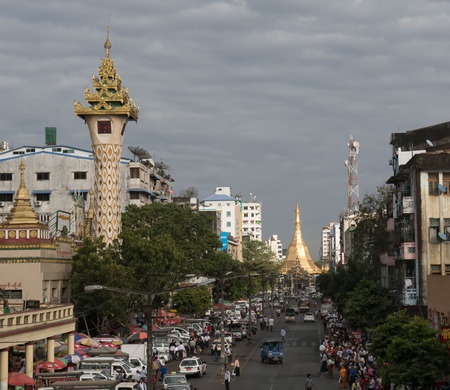5 September, 2017
Q. What do you consider to be the major trends shaping M&A activity in your region over the last 12 months? What factors are driving deals in the current market?
Ramachandra: Foreign investment in Myanmar remains positive despite a slowdown over the last year following the transition to a civilian led government. Myanmar is one of the most natural resource-rich countries in Asia with plentiful supplies of oil & gas reserves, various minerals, jade, precious stones and gems, forest products and solar and hydro power project potential. While there has been very little exploration of Myanmar’s natural resources due to a lack of developed exploration techniques and availability of equipment, the geographical location of Myanmar is central to key markets. In addition, the cost of local labour remains low, with the minimum wage set at approximately US$56 per month for a standard five-day working week. M&A activity into Myanmar will continue to be delayed until the government allows foreign investors to buy shares in ‘local’ companies, which includes local companies trading on the YSX. This will require the government to pass the new Myanmar Companies Law (NMCA) and associated regulations.
Q. Do transactions seem to be concentrated in particular sectors, or is this activity spread across a range of industries?
Ramachandra: We are seeing big ticket transactions spread across a range of different industries. These include the microfinance, hospitality, manufacturing, infrastructure, service and telecommunications sectors. Recently there has been an uptick in foreign interest in acquiring microfinance institutions, with foreign investment coming from neighbouring ASEAN states. The growth rate of merchandise exports in Myanmar is expected to increase from 16.9 percent in 2016 to 18.8 percent later this year, the highest among South-East Asian countries. The European Union’s reinstatement of preferential access for Myanmar’s exports and the US’ suspension of its ban on imports from Myanmar, coupled with the country’s appeal to investors as a low-cost manufacturing base, given its low operating overheads and wage rates, point toward a promising growth in Myanmar’s manufacturing industry. Garment manufacturing has been the largest recipient of foreign direct investment in Myanmar in recent years. Other notable projects include Nissan’s plans to transfer production of the Sunny compact sedan to a new plant in the Bago region. This is expected to employ about 300 people and have an annual output capacity of 10,000 cars. There have been several high-profile deals in the energy sector. Singapore-based Sembcorp Utilities signed a power purchase agreement for a US$300m gas-based plant project with the Myanmar Electric Power Enterprise. This will involve the construction of a 230MW gas-fired power plant in Mawlamyaing and a 225MW gas-fired power plant in Myingyan. However, for the time being M&A activity in the energy sector remains slow. In 2015, the travel and tourism sector in Myanmar saw 6.8 percent growth in direct contribution to the country’s GDP, and the sector is expected to grow at about 8.4 percent per annum in its direct contribution to GDP from 2015 to 2025. In anticipation of the surge in visitor numbers, developers have moved to address the scarcity of hotel accommodation in the country. Starwood Hotels & Resorts Worldwide Inc. has signed on to build the Sheraton Yangon Hotel in the Tamwe Township. Future Group Co Ltd and Pyay Phyo Tun International Co Ltd have plans to develop a US$150m sea view condominium and hotel in Myeik, Tanintharyi. In January 2016, Yoma Strategic Holdings Ltd announced a landmark development project located at the heart of the downtown Yangon business district, which will convert the former headquarters of the Myanmar Railway Company into the Yangon Peninsula Hotel, complemented by luxury residences, hotel and commercial developments. This has been a notable success with construction still underway.
Q. What trends are you seeing in terms of valuations and transaction multiples? Is there often a gap in price expectations between buyers and sellers?
Ramachandra: At this stage Myanmar is not experiencing much high-profile M&A activity. Generally, most M&A transactions are usually on a smaller scale and are under US$25m. That said, there have been some large deals to date, including Kirin buying 55 percent of Myanmar Brewery in 2015 and Axiata purchasing Digicel Myanmar Tower Co., Ltd in 2016. We are seeing a considerable gap in price expectations between buyers and sellers, however. This is a result of first-time entrant buyers who are learning about the market challenges in Myanmar when undertaking the due diligence process.
Q. How would you describe general liquidity levels for M&A financing? To what extent is debt available to support M&A activity?
Ramachandra: Debt financing to fund M&A activity in Myanmar is difficult to obtain. As a cash-based society, Myanmar’s finance sector has been largely under-developed due to its exclusion from the global banking system, coupled with its ongoing struggle to recover from the 2003 banking crisis and subsequent heavy-handed regulation. Local banks have stringent requirements for extending loans to businesses. This means, generally, that foreigners are unable to obtain financing from local banks. Taking security as a foreign investor over immoveable property – in the form of land and buildings – involving a mortgage over land, as well as ‘land use rights’, is challenging. The basic rule is that foreign ownership of ‘immoveable property’ is significantly restricted. Accordingly, M&A financing is typically sourced offshore as tight domestic and international restrictions limit the sources of financing for the private sector. Capital markets, another source of financing, are not yet available in Myanmar; the country is still in the process of developing its capital market. Strategic alliances are another option that some companies have chosen.
Q. What steps should a buyer take to minimise transactional risk in a deal? Is thorough due diligence an indispensable part of the process?
Ramachandra: Engaging skilled counsel is an essential first stage of this process. Parties should undertake an extensive and thorough due diligence of a target to minimise transactional risk. This will take significantly more time than in developed markets as documentation will need to be translated and frequent visits to the Directorate of Investment and Company Administration (DICA) will be required for clarification purposes. It is crucial that the purchaser takes its time and is patient with the due diligence process. Often, subsequent meetings with representatives of the target are necessary to clarify details missing from due diligence documentation. Given that M&A activity in Myanmar is still in its infancy, adopting stringent conditions precedents to any sale and purchase agreement is paramount.
Q. How important is local market knowledge when it comes to closing deals?
Ramachandra: Local market knowledge is critical to closing any deal in Myanmar. Acquiring accurate market data is necessary for making sound business decisions, such as introducing a new product or service into the market or acquiring a business that manufactures or sells an existing product or service. We recommend that a thorough assessment of the political, economic and business environment is obtained, prior to considering any deal. The basic fundamentals should never be overlooked, for example, is there actually demand for this product in Myanmar and why is the vendor selling?
Q. What is your advice to buyers on planning for post-deal integration? How important is this process in unlocking future value?
Ramachandra: We recommend that detailed post-deal integration planning be considered during the due diligence phase. Typically, this seems to be an area that is often overlooked. If post-deal integration planning is coupled with the due diligence phase it is much easier to identify and rectify those risks that may occur down the track.
For further information, please contact:
Krishna Ramachandra, Partner, Duane Morris & Selvam
kramachandra@duanemorrisselvam.com
See our full Doing Business In Myanmar Report via this link. https://www.investingmyanmar.com

.jpg)






